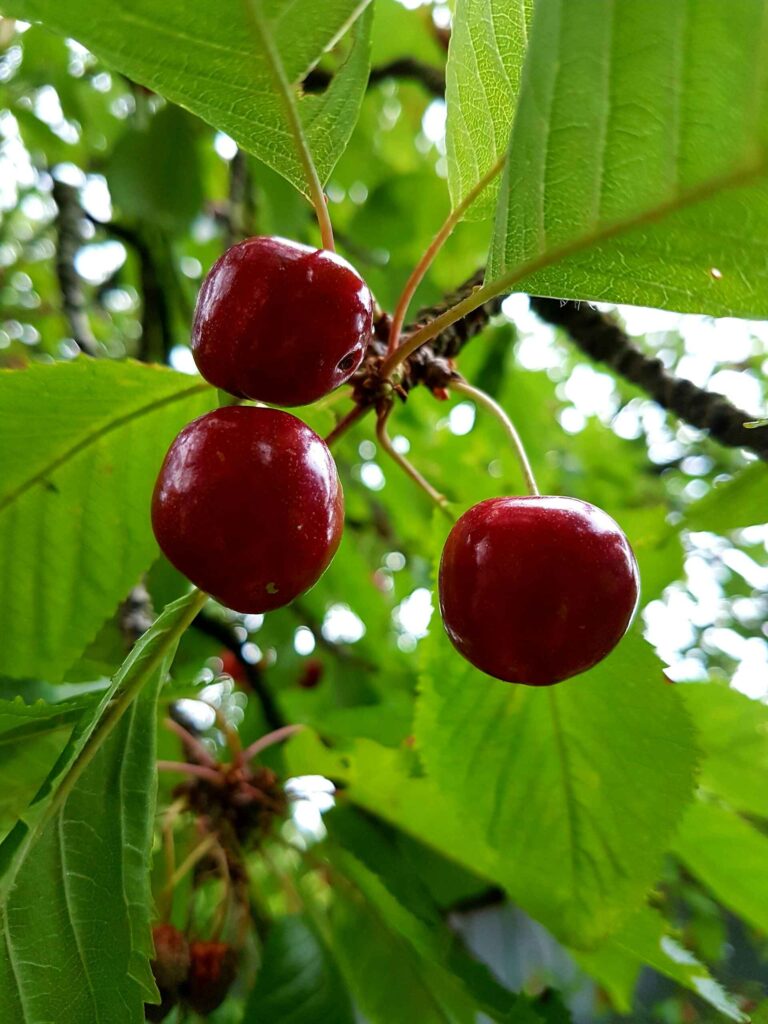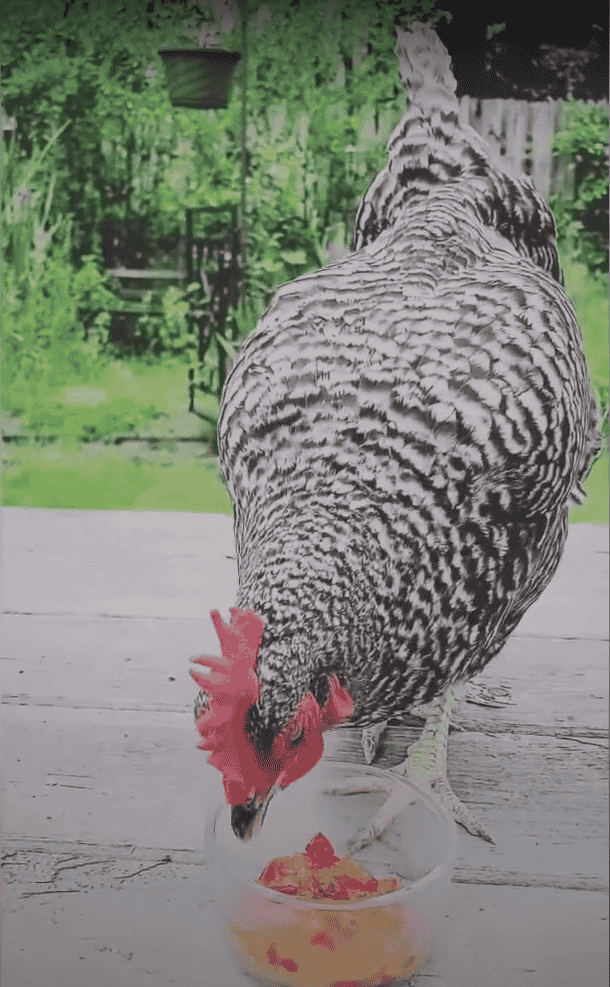Have you ever noticed how chickens love to peck at anything colorful and tasty? Cherries are no exception, offering a wide variety of nutrients that can keep your chickens healthy and energetic.
Many farmers have wondered about the pros and cons of adding cherries to their flock’s diet, and the good news is that they’re considered safe in moderation. While chickens can eat cherries whole, they’ll probably skip the hard pits, which makes it easier to enjoy this sweet treat without issues.
However, for baby chicks, it’s best to be cautious, as their sensitive digestive tracts may struggle to handle too much at once. In my own flock, introducing cherries have been a fun and healthy addition. The bioavailable nutrients in this fruit have made it a favorite snack, especially when mixed with other fruits.
I always explore the right balance to avoid overloading them with sugar or upsetting their diet. While the benefits are undeniable, I keep a close eye on portion sizes and any potential watchouts. Knowing how to feed them properly ensures the best results for a happy and thriving flock.

Table of Contents
ToggleCan Chickens Eat Cherries?
Yes, chickens can absolutely eat cherries, and they love this tasty treat! For many farmers, offering fresh cherries as an occasional snack is a simple way to give their flock a boost of essential vitamins and minerals like calcium, potassium, and vitamin C.
However, it’s crucial to remember that cherries should not replace a balanced diet or the specially formulated food in their feeders. Feeding large amounts of cherries may cause digestive problems, so moderation is key. In my experience, a few cherries here and there make for a healthy, enjoyable snack without upsetting their nutritional needs.
Can Chickens Eat Cherry Pits?
While chickens can safely eat cherries, the pits are something to be cautious about. These pits contain chemicals that can produce cyanide when digested, but it’s rare for chickens to actually devour them.
Most chickens will instinctively peck around the whole fruit and focus on the edible parts, leaving the pit behind. If they do accidentally consume a smaller piece of the pit, it’s generally not a problem, and they rarely experience serious health issues.
From my experience, as long as you’re feeding them properly and keeping an eye on their diet, there’s nothing wrong with offering them cherries, as the pits are not typically something they suffer from eating.

Can Chickens Eat Cherry Stems?
When it comes to feeding cherries to your chickens, there’s no need to be overly concerned about removing the stems. Unlike dogs or cats, chickens are naturally picky eaters and will only eat what they can comfortably digest.
While cherry stems do carry some risk of toxicity, most chickens will simply leave them alone, much like they avoid the pits. In my experience, chickens instinctively know how to handle cherries, making it a safe treat as long as it’s given in moderation.
Can Chickens Eat Cherry Skin?
Yes, chickens can enjoy cherries along with their cherry skin, as both are highly nutritious and great to feed your flock. Packed with high fiber, vitamin C, magnesium, copper, and even hard-to-find potassium, these fruits offer a diverse range of health benefits. Your chickens will absolutely love their rich content, making cherries a perfect addition to their diet in moderation.
Which Types Of Cherries Can Chickens Eat?
Chickens can safely consume various types of cherries, but some are better suited for them than others. Wild cherries and fresh cherries are excellent for your flock, as they provide vital nutrition and keep your chickens happy and healthy.
Sweet cherries are another favorite, but make sure they’re free from pesticides before offering them. Dried cherries, while enriching with nutrients like iron and magnesium, should be used sparingly to avoid issues like diarrhea.
Additionally, all cherries should be cut into small pieces to make them easier to digest, as larger chunks can be difficult for chickens to handle. With proper moderation, these fruits can be a delicious and beneficial treat for your flock.
Can Chickens Eat Sweet Cherries?
Yes, chickens can enjoy sweet cherries, including popular varieties like Queen Anne and Bing. These cherries, known for their sweet taste and high sugar content, can be a delightful treat for your flock.
From my experience, chickens will devour them even faster than you or your family might expect! There’s no problem with feeding them any sweet cherry variety, but like any treat, it’s best to offer them in moderation to maintain balance in their diet.
Can Chickens Eat Sour Cherries?
If you’re looking for an alternative to sweet cherries, sour cherries are a great option for your chickens. They have fewer calories and are packed with vitamins and minerals, making them a nutritious choice. However, it’s worth noting that if your flock has a sweet tooth, these cherries may not be eaten as quickly as the sweet cherry varieties they are used to. Offering sour cherries can still provide variety in their diet while keeping them healthy.
Can Chickens Eat Wild Cherries?
Wild cherries are known to be more bitter compared to sweet cherries or even sour cherries, which might not make them as appealing to your flock. However, if you want to offer something different, you can still allow your chickens to enjoy them occasionally. While they might not appeal to every chicken, some may take a liking to them over time, adding variety to their diet.
Can Chickens Eat Canned/Jarred Cherries?
While canned cherries are not poisonous or immediately harmful to your chickens, they can be detrimental to their health over the long term. This is because they contain a high amount of added sugar, which is not ideal for their diet. It’s best to avoid feeding them to ensure your flock stays healthy and happy.

How To Feed Cherries To Your Chickens
Feeding cherries can be a fun and healthy treat, but there are different ways to ensure it’s safe and enjoyable for them. You can decide to feed them whole cherries, which they will happily peck at, avoiding the cherry pits naturally.
If you’re concerned about choking or digestion, cutting cherries into smaller pieces is a good option for easier consumption. Fresh cherries are packed with vitamins and nutrients, but always remove the stems and leaves, as these are too tough for their systems to process.
For added variety, you can use dried cherries or create a fun snack mix that includes raisins, oyster shells, or dried meal worms. Avoid any cherries with added sugar, as it can cause discomfort or health issues over time.
You can also make feeding cherries entertaining by threading them on a string or fishing line, creating a swinging toy for your flock. Whether from a tree or the fruit stand, cherries are a great way to provide a mix of fun and nutrition for your chickens when fed safely
How Many Cherries Can Chickens Eat?
Feeding cherries to your chickens can be a delightful treat, but it’s important to follow the golden rule of moderation. Around 2-4 cherries per chicken, a few times a week, is the ideal amount to ensure your chicken friends enjoy the benefits without issues.
Overfeeding cherries can lead to changes in their poop consistency or even digestive trouble if the cherry skin proves too difficult to digest.
To keep things safe, it’s best to remove the skin and offer cherries as an occasional snack rather than making them a staple in their diet. If you notice a dramatic change, be sure to scale back and balance their intake with other healthy fruit options for your flock.

Benefits of Cherries For Your Flock
Cherries are a fantastic natural source of essential nutrients that can improve your flock’s overall health and well-being. Packed with vitamins like vitamin A, vitamin C, and vitamin E, they offer numerous benefits for your chickens.
For example, vitamin A supports eyesight, growth, and reproduction, while vitamin E enhances neurological function and protects against stress-related conditions like encephalomalacia. Moreover, cherries contain antioxidants that boost fertility and benefit egg production.
Cherries are also rich in minerals like calcium, phosphorus, zinc, and iron, which play crucial roles in maintaining bone strength, egg quality and preventing anemia. Nutrients like choline help with fat metabolism in the liver, and magnesium helps prevent perosis, ensuring your chickens stay healthy and active. With their high levels of manganese, potassium, and copper, cherries support muscles, nerves, and even protect against conditions like coccidiosis.
While cherries are a safe and nutritious treat, it’s important to feed them in moderation to avoid overfeeding or excessive sugar intake, which could lead to digestive issues. Start with a small amount and gradually increase it while monitoring their response.
For the best results, introduce cherries as a supplement to a balanced diet alongside other healthy fruit options. Whether fresh or dried, cherries can make a delicious addition to their feeding routine, supporting their energy levels and overall capacity to thrive.
Can Baby Chicks Eat Cherries?
Baby chicks may enjoy the taste of cherries, but their nutritional needs during rapid growth require a specific diet to keep them healthy. Feeding cherries in small amounts is fine, but you should always cut them into smaller pieces to avoid choking hazards.
Since pits are hazardous, they are strictly off-limits for chicks due to their size. It is better to prioritize a balanced diet with starter feed, chick feed, or chick starter mixes, supplemented with live foods, until they reach adulthood.
Can Chickens Eat Cherry Blossoms?
Yes, chickens can safely eat cherry blossoms, as they pose no threat of poisoning like the wilting leaves might. Chickens are often drawn to the bright colors of the blossoms and the insects that are attracted to them.
Allowing them to peck at blossoms can provide a fun and safe way for them to explore their surroundings. It’s likely they will enjoy foraging among the cherry blossoms without any harm.
Do Chickens Like Cherries?
Chickens and cherries share a longstanding relationship, with chickens often pecking at the tart fruit. While some may enjoy the sour taste, others can be a bit picky, as chickens have different tastes just like humans.
To get them used to new foods like fruits, it’s important to monitor their behavior and start with smaller amounts. Gradually increasing the amount can help ensure they eat safely and enjoyably. Always ensure they are encouraged to explore these nutritious options while consuming food in moderation.
Final Recap
Cherries are a special treat for chickens, but like any food, they should be offered in moderation. When feeding, always cut cherries into smaller pieces and remove the pits to ensure safety.
Chickens may be picky, so offer new foods like cherries alongside other favorite treats such as grapes, peaches, blueberries, and strawberries. With proper monitoring and guidance, you can encourage your backyard chickens to enjoy these fruits happily while keeping their portion size under control.
Watching your chickens munching on cherries and other nutritious options is always a joy and ensures they stay healthy and loved.




